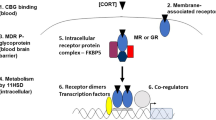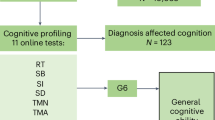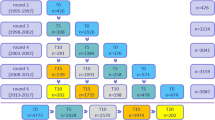Abstract
Depression and cognitive decline have been associated with changes in circulating cortisol concentrations. Cortisol exerts its functions through mineralocorticoid (MR) and glucocorticoid (GR) receptors. However, data on the influence of variations in the MR and GR genes on depressive symptoms and cognitive functioning in older adults are scarce. Therefore, we explored the impact of MR-215G/C, MR-I180V, GR-ER22/23EK, GR-N363S, and GR-BclI polymorphisms on these end points in the population-based Leiden 85-plus Study. This prospective study includes 563 participants aged 85 years and older, with a mean follow-up of 4.2 years. In this study, high morning cortisol levels (per 1 SD cortisol) associated with impairments in global cognitive functioning (p=0.002) at baseline (age 85). These impairments were mainly attributable to lower attention (p=0.057) and slower processing speed (p=0.014). Similar effects were also observed during follow-up (age 85–90), where participants with higher cortisol levels (per 1 SD cortisol) had impaired global cognitive functioning (p=0.003), as well as impairments in attention (p=0.034) and processing speed (p=0.013). Changes in depressive symptoms were observed for the MR-I180V single-nucleotide polymorphism (SNP), where during follow-up the prevalence of depressive symptoms was higher in the 180V-allele carriers (p=0.049) compared to noncarriers. Dependent on these polymorphisms, no differences in overall and in specific domains of cognitive functioning were observed. In conclusion, the MR-I180V SNP has a specific effect on depressive symptoms, independent from cognitive functioning, and other polymorphisms in the MR and GR genes. In contrast, these genetic variants in the MR and GR genes do not influence cognitive functioning in old age.
Similar content being viewed by others
Log in or create a free account to read this content
Gain free access to this article, as well as selected content from this journal and more on nature.com
or
References
Arai K, Nakagomi Y, Iketani M, Shimura Y, Amemiya S, Ohyama K et al (2003). Functional polymorphisms in the mineralocorticoid receptor and amirolide-sensitive sodium channel genes in a patient with sporadic pseudohypoaldosteronism. Hum Genet 112: 91–97.
Belanoff JK, Gross K, Yager A, Schatzberg AF (2001a). Corticosteroids and cognition. J Psychiatr Res 35: 127–145.
Belanoff JK, Kalehzan M, Sund B, Fleming Ficek SK, Schatzberg AF (2001b). Cortisol activity and cognitive changes in psychotic major depression. Am J Psychiatry 158: 1612–1616.
Binder EB, Salyakina D, Lichtner P, Wochnik GM, Ising M, Putz B et al (2004). Polymorphisms in FKBP5 are associated with increased recurrence of depressive episodes and rapid response to antidepressant treatment. Nat Genet 36: 1319–1325.
Bootsma-van der Wiel A, van Exel E, De Craen AJ, Gussekloo J, Lagaay AM, Knook DL et al (2002). A high response is not essential to prevent selection bias: results from the Leiden 85-plus study. J Clin Epidemiol 55: 1119–1125.
Brand N, Jolles J (1985). Learning and retrieval rate of words presented auditorily and visually. J Gen Psychol 112: 201–210.
De Bosscher K, Vanden Berghe W, Haegeman G (2003). The interplay between the glucocorticoid receptor and nuclear factor-[kappa]B or activator protein-1: molecular mechanisms for gene repression. Endocr Rev 24: 488–522.
De Craen AJ, Heeren TJ, Gussekloo J (2003). Accuracy of the 15-item geriatric depression scale (GDS-15) in a community sample of the oldest old. Int J Geriatr Psychiatry 18: 63–66.
de Kloet ER, Joels M, Holsboer F (2005). Stress and the brain: from adaptation to disease. Nat Rev Neurosci 6: 463–475.
de Kloet ER, Vreugdenhil E, Oitzl MS, Joels M (1998). Brain corticosteroid receptor balance in health and disease. Endocr Rev 19: 269–301.
Folstein MF, Folstein SE, McHugh PR (1975). ‘Mini-mental state’. A practical method for grading the cognitive state of patients for the clinician. J Psychiatr Res 12: 189–198.
Herman JP (2003). Central mechanisms of stress integration: hierarchical circuitry controlling hypothalamo–pituitary–adrenocortical responsiveness. Front Neuroendocrinol 24: 151–180.
Holsboer F (2000). The corticosteroid receptor hypothesis of depression. Neuropsychopharmacology 23: 477–501.
Holsboer F (2001). Stress, hypercortisolism and corticosteroid receptors in depression: implications for therapy. J Affect Disord 62: 77–91.
Houx PJ, Shepherd J, Blauw GJ, Murphy MB, Ford I, Bollen EL et al (2002). Testing cognitive function in elderly populations: the PROSPER study. PROspective Study of Pravastatin in the Elderly at Risk. J Neurol Neurosurg Psychiatry 73: 385–389.
Huizenga NA, Koper JW, de Lange P, Pols HA, Stolk RP, Burger H et al (1998). A polymorphism in the glucocorticoid receptor gene may be associated with and increased sensitivity to glucocorticoids in vivo. J Clin Endocrinol Metab 83: 144–151.
Jameison K, Dinan TG (2001). Glucocorticoids and cognitive function: from physiology to pathophysiology. Hum Psychopharmacol 16: 293–302.
Klein M, Ponds RW, Houx PJ, Jolles J (1997). Effect of test duration on age-related differences in Stroop interference. J Clin Exp Neuropsychol 19: 77–82.
Lupien SJ, Maheu FS, Weekes N (2005). Glucocorticoids: effects on human cogntion. In: Steckler T, Kalin NH, Reul JMHM (eds). Handbook of Stress and the Brain. Elsevier Science: Amsterdam. pp 387–402.
Munck A, Guyre PM, Holbrook NJ (1984). Physiological functions of glucocorticoids in stress and their relation to pharmacological actions. Endocr Rev 5: 25–44.
Newcomer JW, Selke G, Melson AK, Hershey T, Craft S, Richards K et al (1999). Decreased memory performance in healthy humans induced by stress-level cortisol treatment. Arch Gen Psychiatry 56: 527–533.
Pascual-Le Tallec L, Demange C, Lombes M (2004). Human mineralocorticoid receptor A and B protein forms produced by alternative translation sites display different transcriptional activities. Eur J Endocrinol 150: 585–590.
Pascual-Le Tallec L, Lombes M (2005). The mineralocorticoid receptor: a journey exploring its diversity and specificity of action. Mol Endocrinol 19: 2211–2221.
van Rossum EF, Binder EB, Majer M, Koper JW, Ising M, Modell S et al (2006). Polymorphisms of the glucocorticoid receptor gene and major depression. Biol Psychiatry 59: 681–688.
van Rossum EF, Koper JW, Huizenga NA, Uitterlinden AG, Janssen JA, Brinkmann AO et al (2002). A polymorphism in the glucocorticoid receptor gene, which decreases sensitivity to glucocorticoids in vivo, is associated with low insulin and cholesterol levels. Diabetes 51: 3128–3134.
van Rossum EF, Koper JW, Van Den Beld AW, Uitterlinden AG, Arp P, Ester W et al (2003). Identification of the BclI polymorphism in the glucocorticoid receptor gene: association with sensitivity to glucocorticoids in vivo and body mass index. Clin Endocrinol (Oxford) 59: 585–592.
van West D, Van Den EF, Del Favero J, Souery D, Norrback KF, Van Duijn C et al (2006). Glucocorticoid receptor gene-based SNP analysis in patients with recurrent major depression. Neuropsychopharmacology 31: 620–627.
Acknowledgements
This work was supported by an IOP grant (Innovative Orientated Research) from the Dutch Ministry of Economic Affairs (Grant number IGE010114), and by the Centre for Medical Systems Biology (CMSB), which is a center of excellence approved by the Netherlands Genomics Initiative/Netherlands Organization for Scientific Research (NWO). The study was also supported by a Marie Curie Fellowship of the European Community program EUROGENDIS ‘The Genetic Basis of Disease’ for MK, under contract number QLGA-GH-00-60005-59. All authors have seen and agreed with the contents of the manuscript and none of the authors have any financial interests to disclose.
Author information
Authors and Affiliations
Corresponding author
Rights and permissions
About this article
Cite this article
Kuningas, M., de Rijk, R., Westendorp, R. et al. Mental Performance in Old Age Dependent on Cortisol and Genetic Variance in the Mineralocorticoid and Glucocorticoid Receptors. Neuropsychopharmacol 32, 1295–1301 (2007). https://doi.org/10.1038/sj.npp.1301260
Received:
Accepted:
Published:
Issue date:
DOI: https://doi.org/10.1038/sj.npp.1301260
Keywords
This article is cited by
-
Mechanisms of mineralocorticoid receptor-associated hypertension in diabetes mellitus: the role of O-GlcNAc modification
Hypertension Research (2023)
-
Dysregulation of the hypothalamic pituitary adrenal (HPA) axis and cognitive capability at older ages: individual participant meta-analysis of five cohorts
Scientific Reports (2019)
-
HPA Axis Genes, and Their Interaction with Childhood Maltreatment, are Related to Cortisol Levels and Stress-Related Phenotypes
Neuropsychopharmacology (2017)
-
Role of mineralocorticoid receptors on the hypothalamus–pituitary–adrenal axis in humans
Endocrine (2013)
-
MR and GR functional SNPs may modulate tobacco smoking susceptibility
Journal of Neural Transmission (2013)



